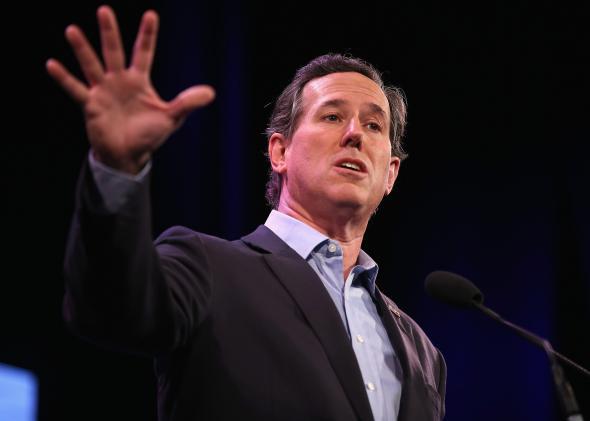How much do the current crop of Republican presidential candidates hate gay people? Enough to render their marriages invalid? Enough to take away their children? Enough to make their very existence illegal?
In previous years, various GOP candidates have answered “yes” to all of the above. This cycle, they’ve given no indication that their views have changed. But America’s certainly have: Around 61 percent of the population thinks same-sex marriage should be legal, up from 39 percent a decade ago. The same old policy questions about gay rights have grown stale, and the same old answers—no rights for gays, full stop—are now at once enervating and alarming. So the media has latched onto a new question: No matter your views on gay marriage, would you attend the wedding of a gay loved one?
This question has been pilloried by liberals and conservatives alike. “The dumbest kind of hypothetical,” said the National Journal’s Emma Roller. “Silly,” “bizarre,” and “frivolous,” said Vox’s German Lopez. “Irrelevant and inane,” suggested the American Prospect’s Paul Waldman. A “gotcha question,” said the Examiner’s Mark Whittington. These criticisms strike me as exceedingly shortsighted. The wedding question is cleverly designed to force candidates into taking a moral stand on what could otherwise be passed off as a dry political question. And, even more brilliantly, it forces candidates into a position of either callous honesty or brazen hypocrisy.
The morality factor in particular has long been absent from the Republican discourse on gay marriage. This is puzzling, since the standard GOP position on gay rights is—a majority of Americans now seem to believe—fundamentally immoral. Today, a conservative Republican likely opposes both same-sex marriage and gay adoption. In other words, they’d rather keep children orphaned than permit them to be adopted by a loving same-sex couple. A moderate Republican might permit gay adoption but oppose same-sex marriage. That means they’re content to force children to explain to their friends why their parents’ relationship isn’t worthy enough to be recognized by the state. And, of course, they’re willing to force these children into legally precarious situations wherein, should one parent die, the other may be unable to assert any parental rights over his own child.
These logical consequences of gay rights opposition are a pretty prolix, so the media has adopted the wedding question as a shorthand to cut to the heart of the moral matter. Yes, the question acknowledges, you oppose same-sex marriage—but what about the wedding of someone you know and love? Do you oppose their marriage so vehemently that you couldn’t bear to help the celebrate it? And could you really look them in the eyes on their happiest day and maintain your stance that their union—perhaps their very relationship—should be illegal?
The only candidate to answer this question in the affirmative, Rick Santorum, deserves to be commended. Yes, his response is heartless, but it least it was honest. In comparison, here’s Ohio Gov. John Kasich’s explanation of why he will attend the same-sex wedding of his friend:
Just because you’re opposed to something doesn’t mean that you don’t care about your friends, other human beings. My friend knows how I feel about the issue, but I’m not here to have a war with him. I care about my friend, and so it’s pretty simple for me. … It’s pretty simple. I care about him. He cares about me. He invited me to something. I’m going to go do it. It’s not that complicated.
This statement—from a quasi-moderate conservative—is breathtakingly dishonest and deceptive. Almost every sentence is self-evidently untrue. Kasich’s opposition to marriage equality proves that he doesn’t care about gay “human beings,” so much so that he’s willing, eager, to strip them of their rights. If there is a “war” here, Kasich and his allies are the aggressors: Kasich himself supported Ohio’s constitutional ban on gay marriage, barring same-sex marriages (like his friend’s) from legal recognition. Now Kasich has continued to support his state’s ban in court, actively fighting to keep his friend’s marriage invalid. I cannot know whether Kasich truly “care[s] about [his] friend.” But it seems to me that if he did, he would at least stop pushing to humiliate him by stripping his relationship of legal dignity.
What the gay wedding question really illustrates, then, is the totally untenability of the current moderate Republican line of gay marriage: We “respect” your marriages, even as we strive to invalidate them. That position is pure nonsense, a façade of tolerance barely concealing a core of cold-hearted animus. The gay wedding question might sound silly on the surface, but it efficiently cuts through the GOP’s posturing and dissembling and forces them to lay bare the illogic of their position. It’s a question we should ask, and keep asking, until we get an honest answer from every candidate. Only then will we know the answer to the much more important question that no Republican will answer honestly: Just how much do you hate gay people?
